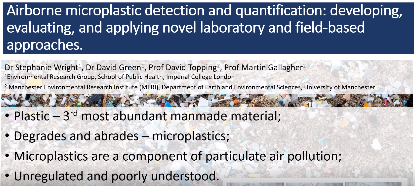Airborne microplastic detection and quantification, developing, evaluating, and applying novel laboratory and field-based approaches
About the Project
Applications are invited for a 4 year PhD studentship starting in Autumn 2022 as part of the EPSRC CDT in Aerosol Science
Project description
The accumulation of persistent, polymeric wear particles in the atmosphere is an emerging public health issue. Commonly termed ‘microplastic’, this particle domain includes synthetic fibres from textiles, fragments from plastic articles and tyre wear emissions from road traffic. Inhalation exposure to elevated levels of inhalable and respirable microplastics has been linked to occupational lung disease and, recently, to upper airway irritation due to the shedding of polypropylene fibres from mask-wearing during the SARS-CoV-2 pandemic. Whilst these emissions contribute to ambient/indoor aerosol concentrations and the associated negative health impacts, including premature mortality, the proportion and sources of microplastics in the organic carbon fraction of ambient particulate matter (PM10) across environments remains poorly defined. This is largely due to a lack of high-throughput quantitative and online methods for their measurement.
In collaboration with Leco, this project aims to characterise the presence and quantity of microplastic aerosols in indoor and outdoor environments. You will gain experience in cutting-edge laboratory instrumentation – pyrolysis-two-dimensional gas chromatography time of flight mass spectrometry – to identify unique chemical tracers for microplastics from diverse urban sources. You will also explore novel technologies for their measurement in the field. This project brings together a team of supervisors with expertise in microplastics, atmospheric science and advanced data analytical tools: Dr Stephanie Wright, Dr David Green, Dr Ian Mudway (Imperial College London), Prof Martin Gallagher and Prof David Topping (Univ. of Manchester).
Dr Stephanie Wright would be pleased to discuss this project further with interested candidates: s.wright19@imperial.ac.uk
About the Centre for Doctoral training in Aerosol Science
Aerosol science is crucial to disciplines as broad ranging as transmission of disease, drug delivery to the lungs, climate change, energy and combustion science, novel materials, and consumer and agricultural products.
An aerosol is any collection of particles dispersed in a gas. The CDT brings together a multi-disciplinary team of 80 post-graduate students and academics from 7 UK universities spanning the physical, environmental and health sciences, and engineering. Our aim is to tackle the global challenges in which aerosol science is key.
Further details are available from our website: https://www.aerosol-cdt.ac.uk/
Doctoral Training in Aerosol Science
During your doctorate, you will learn to research in diverse multidisciplinary teams, gain an advanced understanding of the core physical science of aerosols, and collaborate with industrial and public sector partners, equipping you to undertake ground-breaking research in aerosol science.
During the first 7 months of your PhD, you will join the CDT cohort based at the University of Bristol. Core training in aerosol science, research methods, professionalism and translation will be delivered by Team Based Learning. You will then undertake a short research project at your home or partner institution before starting your PhD research. You will gain experience outside academia in a placement with an industrial/public sector partner in Year 2 or 3.
More Information and How to Apply
Candidates who aspire to work in a multidisciplinary field, and hold or will achieve a minimum of an upper second-class undergraduate degree in any of these areas are encouraged to apply: chemistry, physics, biological sciences, life and medical sciences, mathematics and computer science, chemical and mechanical engineering, pharmaceutical and environmental sciences.
Visit our website:
https://www.aerosol-cdt.ac.uk/ Contact us: aerosol-science@bristol.ac.uk
Application Deadline:
Apply by 9am on Monday 17th January 2022. Shortlisting will take place after the deadline, and shortlisted candidates will be invited to participate in the CDT online interview process during w/c 7th February 2022. Applications after this date will be subject to remaining availability of studentships.
Diversity and Inclusion
We are committed to furthering issues of equality, diversity and inclusion. We recognise the benefits of recruiting a diverse group of students to the Aerosol CDT and strive to avoid any conscious or unconscious bias in our recruitment. The needs of individuals will be accommodated during the recruitment process and while studying with the CDT. Further information on our commitment to equality and diversity can be found on our website.
Funding Notes
This project is funded as part of the EPSRC CDT in Aerosol Science. Successful candidates meeting the funding criteria will receive a studentship covering tuition fees, research and training support grant, plus a stipend to cover your living expenses while you train, paid at the standard UKRI rate. View Website
References
Brahney, J., Mahowald, N., Prank, M., Cornwell, G., Klimont, Z., Matsui, H., and Prather, K.A. 2021. Constraining the atmospheric limb of the plastic cycle. PNAS. 118(16), e2020719118. doi.org/10.1073/pnas.2020719118.Jones, N., Wendt, J., Wright, S., Hartner, E., and Groeger, T. 2021. Analysis of microplastics in environmental samples by pyrolysis/thermal desorption-(GC)xGC-TOFMS. Chromatography Today. May/June 2021.
Forde, E., Gallagher, M., Foot, V., Sarda-Esteve, R., Crawford, I., Kaye, P., Stanley, W., and Topping, D. 2019. Characterisation and source identification of biofluorescent aerosol emissions over winter and summer periods in the United Kingdom. Atmos. Chem. Phys., 19, 1665–1684. doi.org/10.5194/acp-19-1665-2019.

